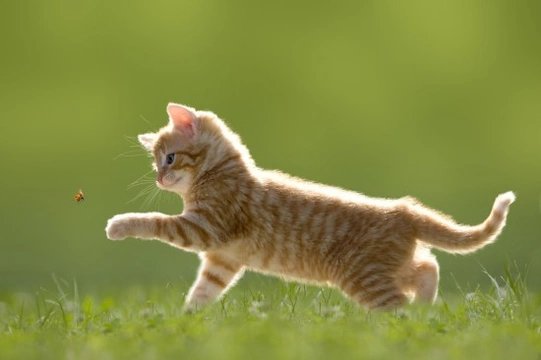
Keeping your cat cool and comfortable during the summer
While cats are less likely than dogs to suffer from overexertion, heatstroke and overheating in hotter weather, it can also be rather more challenging to keep them cool as well.
There are several ways that you can go about helping your cat to stay comfortable and cool during the summer, however, and to minimise the risk of them developing sunburn or overheating. Read on to find out our top summer tips for cat owners.
The colour of your cat
It may come as a surprise to some cat owners to realise that the colour of their cat can affect how capable they are of handing the sun and hot weather!
Black and other dark coloured cats are likely to feel the heat more and get up to a higher body temperature, but their dark hair and skin will also mean that they are better protected against the sun’s rays itself.
White and light coloured cats will tend to find it somewhat easier to stay cool, but they are also at risk of getting sunburn, particularly if they have exposed pink patched on their nose and ears, or their skin is very fine. This might mean that you will need to use a cat-safe sunscreen on these sensitive areas, and will certainly mean that you must ensure that your cat has every opportunity to get into shaded areas out of full sun when they want to.
Water
Cats need free access to clean, fresh water at all times, and this is never more important than during the summer months. Your cat’s water bowl should be kept somewhere cool and out of the sun, and should be replenished throughout the day, with fresh water added regularly.
Many cats will drink from streams and other running water when outside, or lick plants and surfaces to drink misty dew. However, in the summer, these sources of water are much harder to find, so you may find that cats that do not usually show much interest in drinking from their bowl suddenly use it a lot more regularly.
Hot surfaces
Everyone is familiar with the phrase “like a cat on a hot tin roof,” and many walking surfaces can become uncomfortably hot to walk upon when the full heat of the sun is upon them.
Pavements, tarmac, patios and other hard surfaces may become uncomfortably hot for your cat’s exposed paws, and if they are too hot for your bare feet, they will be too hot for your cat too! Try to ensure that there are enough shaded areas outside to allow your cat to get about without having to risk burning their paws, and hose down surfaces that get very hot, such as patios and paths.
Make sure your cat does not get trapped
Many cats will like to go and lie in greenhouses and conservatories to make the most of the early sun, but as the weather heats up, these environment will fast become dangerously hot, and can soon lead to problems such as heatstroke and even potentially death if your cat cannot escape.
Ensure that your cat cannot get trapped in a greenhouse or conservatory, and if you haven’t seen your cat for a while, look for them to make sure that they are safe.
Cats are equally likely to get trapped in cool, shaded areas such as sheds and summer houses in their bid to get out of the worst of the heat, so make sure that you check for cats before you shut the doors, and look for your cat promptly if they appear to be missing!
Feeding
In hot weather, wet cat food can spoil quickly, so make sure that your cat’s food is kept in a cool place, and try to feed them wet food when the temperature drops, such as in the early mornings or in the evening. Cats will not eat spoiled food, and it will also of course attract flies and other nasties, so pay special attention to your cat’s feeding protocols and keeping bowls clean when the weather heats up.
Heatstroke
Heatstroke is less common in cats than in dogs, as dogs are more likely to run themselves to exhaustion and not quit while they are ahead! However, heatstroke can pose a risk to cats as well, but if they have free access to shaded areas, constant fresh water and the chance to relax and cool down, they will usually be ok.
If you spot your cat lying out in full hot sun for a prolonged period of time, check on them to ensure that they are ok, and have not pooped out in the sun. Encourage them to move to a cooler area, and if they appear listless, disoriented or as if they are suffering from the effects of too much sun, move them to a cool place, offer them water, and contact your vet for advice.



